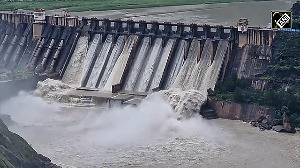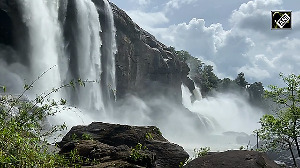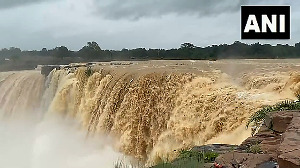'They know that India is no pushover.'
'We have to be extremely vigilant, remain ready and keep strengthening our positions.'
'We have to be militarily strong, whatever be the cost.'

"China cannot be trusted and we must not get complacent since China can only be dealt with from a position of strength," says Lieutenant General Sanjay Kulkarni (retd), PVSM, AVSM, SC, SM, VSM (Retd).
The General commanded a brigade and a division on the Line of Actual Control and was decorated with the Shaurya Chakra for leading his platoon to unfurl the Tricolour in Bilafondla on the Siachen Glacier.
General Sanjay Kulkarni spoke to Rediff.com's Archana Masih in the concluding segment of a two-part interview.
The Chinese have a larger force, better connectivity and technological edge. They can move men and material faster -- how does India match up with technological headstart they have?
The mountains favour the defender.
Indian troops have taken up defences all along the LAC. The Chinese have to come forward to attack us.
If an Indian company is occupying a post, the Chinese will require 6-9 times more troops to dislodge them on a very narrow stretch, thus making it impossible to do so, add to it the rarefied atmosphere and extremely harsh conditions.
The Pakistani troops have been trying extremely hard to dislodge us from Siachen and have failed miserably since 1984.
There are satellites and UAVs alongside Early Warning systems in place to alert the Indian Army of the PLA's misadventurism.
Our troops are prepared for any eventuality to defend the country.
China has violated all agreements to maintain peace and tranquillity along the LAC and have started the stand-off and the responsibility to restore status quo ante April 2020 is theirs.
China understands the limitations of its troops. The CCP (Chinese Communist Party) has realised after Galwan that their troops may find it difficult to face the battle hardened troops in winter.
Technologically, they may have a slight edge. They may have the ammunition, technology, aircraft and missiles, but the man behind the machine matters in the border dispute.
The Indian Army has never had to maintain such large number of troops in such severe conditions over such an extended period of time. What are the challenges of maintaining the troops?
We may not have had such a large deployment on the LAC in the past, but we have always had troops positioned there and have a system in place to maintain them.
The Indian Army knows the challenges and can counter them.
Our troops are tough; they have the knowledge and experience of serving in harsh conditions.
The PLA troops are used to the luxury of arriving at forward locations in centrally heated vehicles and going back after spending a very short time, but now they have stay put. It is affecting their health adversely.
There is a lot of discussion and conflicting information about the PLA having come into our territory, what are your thoughts on the real situation on the border?
It has been stated in Parliament that we will not give an inch of our territory.
The home minister has stated in Parliament that Aksai Chin and PoK is our territory. The statement was made to reiterate the fact that a part of our land has been occupied by Pakistan and China.
Therefore, we are asserting our right on what is ours.
There is no denying that 38,000 sq kms of our territory is under occupation of China in Ladakh.
On May 5, 2020, the Chinese altered the status quo unilaterally. That status quo was a result of several treaties between India and China since 1993. China has thrown all those treaties to the wind!
It would not be wrong to say that China has lost all goodwill it had earned since 1993. Tremendous trust deficit exits between the two countries along the LAC.
We were patrolling up to Finger 8 and they were coming up to Finger 4, there was a protocol in place known as the 'banner drill' and the troops would pull back to their respective positions along the LAC, without firing a shot or for that matter without getting into a fist fight, but the Chinese suddenly got belligerent.
On May 5, the Chinese came to Finger 4 and did not go back. They came to Patrol Point 14 and did not go back resulting in the Galwan clash which altered everything. The present situation is a result of the Chinese provocation.
The Galwan fight back showed the Chinese that the Indian troops on the ground don't wait for orders to fight if the Chinese decide to take law in their own hand and will not accept the status quo being unilaterally changed despite an agreement.

Does not the refusal of the Chinese to withdraw mean that the PLA has entered Indian territory?
The Chinese have been on Indian territory since 1950. It has been said in Parliament that Aksai Chin is ours, but China's G 219 highway passes through Aksai Chin connecting Tibet to Xinjiang.
The Chinese have many perceptions of the LAC which resulted in the 1962 war and the present imbroglio.
The Peace and Tranquillity Agreement of 1993 provided the framework for peace along the border, but all of that changed because the Chinese altered the status quo when they transgressed into Indian territory.
India has stated that it wants the status quo ante April 2020. All military and diplomatic talks that have been going on are solely for this purpose.
Security experts say the troops are in for a prolonged deployment at the LAC. What do you think is the possibility of the Chinese withdrawing?
Since the Chinese believe that power flows from the barrel of the gun, they will not withdraw.
I don't think the Chinese will go back. They have deep pockets and use cheque book diplomacy to exert pressure on our neighbours to put pressure on India.
Can you imagine the billion dollars lent to Pakistan by China to repay the interest free Saudi debt was at 14% rate of interest?
The talks with China have not resulted in any tangible gains on ground so far, the Chinese are in fact gradually strengthening their positions in TAR (Tibet Autonomous Region) and along the LAC and using Pakistan to keep India under pressure.
China cannot be trusted and we must not get complacent since China can only be dealt with from a position of strength.
Even if there is semblance of peace, the Chinese are looking for that one moment of weakness to teach us a lesson. They know that India is no pushover.
Time is of no consequence for the Chinese. They will wait for the appropriate time, even if it means waiting for years.
We have to be extremely vigilant and remain ready in our locations and keep strengthening our positions.
We have to be militarily strong and be able to sustain ourselves, whatever be the cost.
What do you think Xi Jinping and China expect from the hostility at the border?
Xi Jinping wants India to remain boxed in South Asia and would never want India to be seen as a rival of China in Asia.
They look at the USA as their competitor and see India as a hurdle in their attempt to be the Centre of Universe.
The Chinese thought the hostility at the border would give them a free hand in the Indian Ocean since continued pressure will drain India economically to be of any relevance, the alliance of democratic countries against Chinese expansionism has surprised China.
The Chinese are also on the back foot because Xi, the architect of the present imbroglio, did not expect the Indian armed forces to react so swiftly and the way the troops reacted to Chinese pre meditated barbarism in Galwan took the Chinese leadership by surprise.
He expected India to blink, instead India took a firm stand.
The last time the Chinese killed Indian troops was in an ambush in 1975. They have now seen how the Indians have mobilised and have the capacity to sustain themselves in an eyeball to eyeball situation, if provoked.
The Chinese are waiting for India to blink. China feels that if it can make India blink, it will be able to prevail over all the other countries that look up to India to succumb to their pressure.
If India can hold on against China, it will help restore rule of law and boost the confidence of the countries facing Chinese belligerence and look up to India as a reliable partner.
Man to man, India is in a favourable position.
The josh and jazba of our men is at its peak and that should be sustained. If we hold on to those heights in the most unfavourable conditions that will further demoralise the Chinese.
The internal political differences must be kept in check presently we must stand united to face the threat which is very imminent.
The political, military and diplomatic leadership seems to be in sync and our focus should be to build economic strength to catch the bull by the horn.
The Chinese will use all the resources and dirty tricks at their disposal to pin down India and use their proxies at the border to destabilise and demoralise us internally to weaken India economically, an economically weak India will be a militarily weak India.
We must not let that happen. An economically strong and vibrant India will ensure a militarily strong India. That alone is the way forward for peace and tranquillity in the region.
Feature Presentation: Aslam Hunani/Rediff.com











